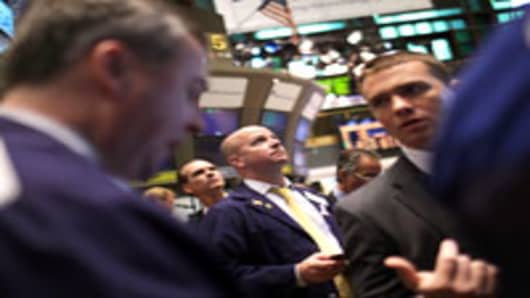Increased talk of a double dip for the world’s biggest economy triggered a precipitous decline on Wall Street Thursday. However, Jim Paulsen of Wells Capital Management says fears of a recession are overblown and that the Federal Reserve may have been over-bearish in its assessment of the U.S. economy.
"It's just a soft patch and the market is medicating itself," said the firm’s chief investment strategist, adding that the Fed's actions so far have done more harm than good for market sentiment.
"I don't see anything the Fed could deliver to the market that we don't already have," Paulsen said, referring to the widely-expected “Operation Twist: unveiled by the Fed on Wednesday. Instead of bleak warnings, he said, the central bank should have taken a more reassuring stance.
"What they did is gave us something that doesn't help at all. But at the same time, went on to say how scared they are about significant risk in global financial problems, which is nothing new," he added. "Everyone's worried about significant risk, but they left the impression that they're out of bullets, and they're scared. And I think that's what set off this recent sell-off."
Paulsen says there are enough reasons to believe the U.S. economy is on the mend, noting that the latest U.S. weekly jobless claims were in the low 400,000 and he pointed to the U.S. Conference Board leading economic index, which rose for a fourth straight month in August.
“The data that has already come out for this quarter by the way, including the rise in real personal consumption for July, the factory orders, the better trade number, it is already suggestive that we got a real GDP number in this third quarter at about 2.5 percent," Paulsen observed.
“The national 30-year mortgage rate's fallen a full percentage point (since March), now down to record lows. The dollar until just the last couple of days had fallen about 10 percent from its highs of a year ago. Energy prices have come down, the money supply in this country, the M2 supply in this country, surging at a 30 percent rate since June. Japan has bounced and is helping supply chains, so I think there's things that should pick us up," he noted.
And with policymakers' hands tied on the fiscal front going into an election year, Paulsen believes markets may finally be free to find their bottom.
"I think it might be our best bet yet, and we're just going to try free market capitalism, for a change. Let the private market behaviors of businesses and investors figure this out, find a bottom on their own, revive on their own,” he said.
With equity markets currently pricing in a recession, Paulsen says investors should watch for trading opportunities. He says expect further downside for the S&P if it falls below 1,100, while a break above 1,225 could trigger more upside.
"I think there could be a big move either way out of this 1,100 to 1,200 range in the next several months," he said. Paulsen recommended buying into oil, as well as consumer staple, healthcare and utility stocks.


